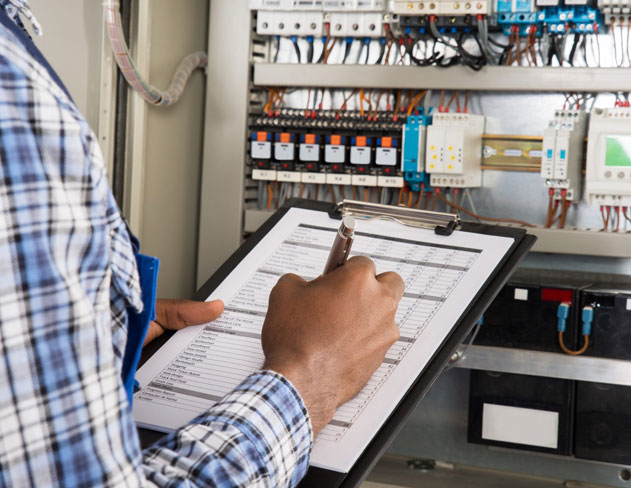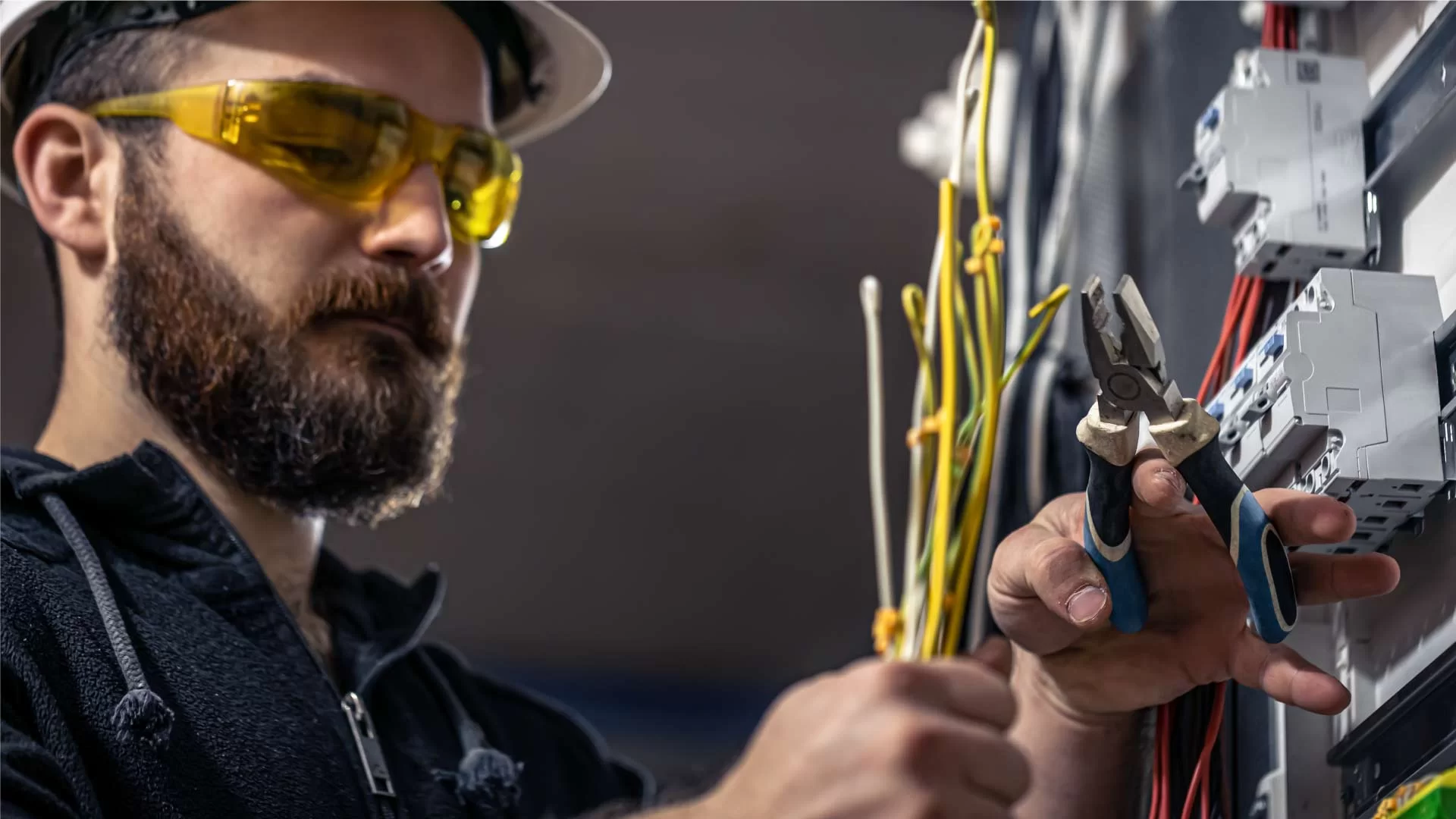



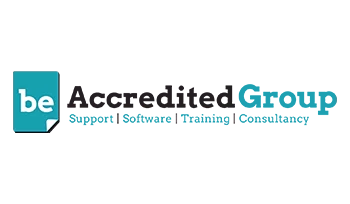
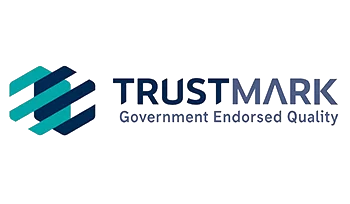
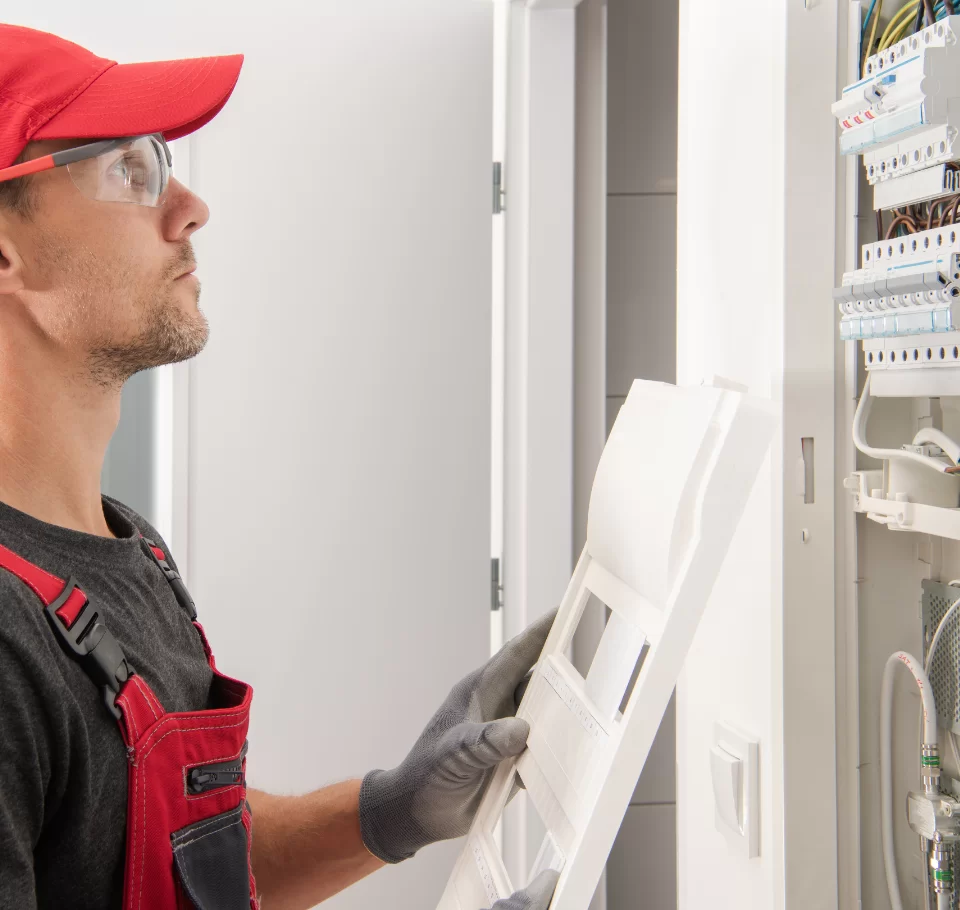
Book your Commercial EICR test today
| Services | Prices From |
|---|---|
| Up to 10 Circuits | £169 |
| Each Additional Circuit | £10 |
Prices exclude VAT.
EICR for commercial properties
At Hexo Electrical Testing, our experienced and qualified commercial electrical inspectors are expert at carrying out EICRs in accordance with best practice whilst minimising downtime for your business.
We offer weekend and evening appointments, as we do need to switch off the power in your premises to complete the EICR, and we appreciate this can affect your usual business operations.
At Hexo Electrical Testing we are skilled at providing quality commercial EICRs and we offer free advice and support to our business clients.
Why are commercial EICRs important?
Commercial EICRs are extremely important. Failure to keep your business premises safe could result in property damage, staff injury and costly business closures. A Satisfactory EICR is probably a requirement of your building insurance.
For your business to be EICR compliant, your premises need a satisfactory status Commercial EICR; to achieve this status any C1, C2 and FI defects found on the EICR inspection will need to be rectified.
Rectifying all C3 recommendations as well is considered best practice and shows that you have gone as far as reasonably possible to ensure a safe fixed electrical installation at your business premises.
What issues can we rectify?
At Hexo Electrical Testing our skilled engineers can rectify any defects identified on the EICR, so we are a one stop shop for your commercial electrical compliance.
We issue your Commercial EICR electronically by email and we attach an itemised quotation for all defects. Once all C1/C2/FI defects have been rectified then we issue you with a Satisfactory EICR for your compliance purposes.
Customer commercial electrical inspections and testing
Along with Electrical Installation Condition Reports, we offer Custom Commercial Electrical Inspections and Testing, as follows:
A Commercial Electrical Installation Condition Report (EICR) provides you with a clear understanding of the state and condition of the electrical installation in your premises and gives you an itemised summary of any electrical defects and their severity.
User change
Occupants come and go if you’re a landlord or building owner. People who are using your property might have different ways of working in it and these changes can cause defects in the electrical set-up present in the business unit.
EICR testing can warn you if the situation is deteriorating or needs work so that you can take the appropriate action.
Your electrical installation has aged
General degradation and age will affect the condition of your electrical installation. Whilst electrical installations are built to last, they do nevertheless deteriorate over time, especially if not properly maintained.
EICR testing can help you identify which parts of your installation need repairing due to degradation and which parts need upgrading due to lack of regulatory compliance.
Being armed with the correct information about your electrical installation can help you to plan which route to take with important business and property decisions.
Commercial EICR for Insurance
Our commercial EICRs are valid for insurance purposes. Your building or public liability insurance may require that you have a Satisfactory EICR and provide evidence of this to comply with the terms of your policy.
Usually, the insurance company will require that your installation is free of any C1/C2/FI defects and is therefore a Satisfactory status. But you should check whether they will require rectification of C3 recommendations too, this may depend on your specific business circumstances.
Contact us at Hexo Electrical Testing to arrange your commercial EICR.
Damaged electrical systems
All properties face the risk of vandalism that could damage the electrical installation.
If your property has been broken into and vandalised or damaged in any way, then contact us to arrange a Commercial EICR. We will be able to provide an itemised schedule of remedial work required to bring the installation up to a safe and Satisfactory condition.
Electricity at Work Regulations 1989
Business owners in London and across the UK must comply with the Electricity at Work Regulations 1989, these regulations are in existence to protect people and properties from electrical danger.
The regulations apply to employees, employers and the self-employed. Under the legislation, electrical equipment includes anything used, or intended to be used, that is powered by electrical energy.
What do the Electricity at Work Regulations Cover?
The regulations cover all electrical safety testing, including Commercial EICRs/Fixed Wire Testing. The regulations place responsibility on the employer to protect their employees and any visitors that enter the business premises from electrical danger, as much as reasonably possible.
Employers can only demonstrate compliance by hiring a competent company to complete electrical inspection and testing of their building, and ultimately obtaining a Satisfactory Commercial EICR.
Is a commercial EICR a legal requirement?
You might be wondering if electrical testing commercial premises is a legal requirement.
Well, it is a legal requirement to comply with the Electricity at Work Regulations and having regular EICR testing carried out on your business premises is an important component of complying with the Electricity at Work Regulations.
According to rhinofirecontrol.com: “Faulty electrics is the most common cause of workplace fires and roughly 12,000 fires a year are caused by damaged, faulty or misused electrical appliances.” Many electrical faults can be rectified by having regular maintenance.
What happens if you don’t have a valid commercial EICR?
Commercial electrical testing is required on all commercial buildings to check for safety and efficiency. Employers have a duty to protect their employees and visitors by ensuring that electrics meet the relevant safety regulations.
If a person is injured by an electrical installation in your commercial property and you don’t have a valid EICR, then they could take legal action against you. As a commercial property owner, you must ensure that your building is well maintained and electrically sound.
How often do I need a commercial EICR?
Commercial EICRs should be conducted at regular intervals. In most cases the frequency for 100% of the electrical installation to be tested is 5 years but some premises require more frequent testing.
Some businesses opt to have 20% of the electrical installation tested each year so still achieving 100% every 5 years while spreading out the cost.
Another benefit of the 20% per year approach is that by having a visit each year the amount of time a defect may be present before rectification is minimised.
Commercial premises that require an EICR every 5 years as a minimum:
- Retail outlets
- Offices
- Community halls
- Hotels (excluding Spas)
- Restaurants
- Schools, Colleges, Universities
- Care Homes
- Churches
- Halls of Residence and Houses of Multiple Occupancy (HMOs)
- Public Houses
Commercial premises that require an EICR more frequently than 5 years as a minimum:
- Swimming Pools – every year
- Medical Locations – every year
- Caravan Parks and Marinas – every year
- Cinemas – every year
- Leisure complexes (excluding swimming pools) – 3 years
- Theatres – 3 years
- Places of public entertainment – 3 years
- Agriculture – 3 years
- Laundrettes – every year
Please contact us if you would like any advice on the frequency of the Commercial EICR testing required for your electrical installation.
What will be the outcome of a commercial EICR?
The desired outcome of a Commercial EICR (fixed wire test) is that those responsible for the building will be alerted to any existing electrical defects, and any electrical areas that may present a problem in the future.
These defects then need to be rectified with remedial electrical works before any serious problems occur.
What does a commercial EICR document include?
After the commercial electrical testing is complete, we send the Commercial EICR document that shows details of all electrical circuits and test results.
This document also holds records of all inspections carried out and highlights any defects with the electrical installation and their code level. The EICR is sent to you electronically usually about one week after the inspection is complete.
The outcome of the commercial electrical certificate will be either Satisfactory or Unsatisfactory (Pass or Fail).
Commercial EICR defects and code levels
During the EICR, our electrical test engineer will identify any issues with the electrical installation and provide a coded observation for each that will be highlighted on the EICR document.
The observations codes will fall into one of the following four categories that range in severity:
Code C1
The most severe observation code, a C1 means danger is present and there is an immediate threat to property and/or life.
Fast action to rectify the defect is mandatory and we are obliged to rectify the level of the defect from a C1 to at least a C2 during the inspection visit. Any number of C1 defects make the EICR Unsatisfactory or a Fail.
Code C2
The C2 code means there is a potentially dangerous defect with your system and urgent corrective work is required. The defect should be rectified urgently and without delay. Any number of C2 defects make the EICR Unsatisfactory or a Fail.
Code C3
Code 3 is a lower-level code defined as ‘Improvement Recommended’, which means a regulatory issue has been identified or an element of the electrical installation could do with improvement. The installation may not comply with the latest regulations and amendments.
This is a formal recommendation for improvement but C3s are not required to be rectified as they do not affect the outcome of the EICR Satisfactory/Unsatisfactory. Pass/Fail. Some organisations may require that C3 defects are rectified to achieve full compliance with the latest electrical regulations.
Code FI
The FI code informs that further investigation into a part of the electrical installation is required. This usually means that our inspector has found something during the EICR that needs to be looked at in more depth.
Low insulation resistance readings may have been measured or there may be untraced electrical circuits in the installation. It is required to rectify any FI defects as FI defects make the EICR Unsatisfactory, or a Fail.
What if defects are found during the commercial EICR inspection?
If any defects are found during the Commercial EICR/Fixed Wire Testing visit there is no need to panic, as at Hexo Electrical Testing we offer a defect repair/remedial service and can rectify any electrical defects your premises may have. We can get your business compliant again quickly and efficiently.
If defects are present in the electrical installation, we will send you an itemised quotation for each defect at the same time as we send your commercial EICR.
How can I achieve a satisfactory EICR status?
To achieve a Satisfactory EICR status all C1/C2/FI defects will need to be rectified. If you would like to achieve full EICR compliance for your premises, then C3 improvements will need completing as well.
We will then need to revisit the premises to carry out the repairs and once remedial works are complete we will issue you with an Electrical Installation Certificate (EIC), or a Minor Works Certificate (MW), along with a satisfactory Electrical Installation Condition Report (EICR).
This is proof that your system is safe and compliant and can be sent to any parties that require a copy.
Typical commercial EICR remedial works
Typical commercial EICR remedial works might include circuit repairs, replacement distribution boards and light fittings, as well as:
- Replacement sockets and switches
- Repairs to damaged cables
- Installation of RCD protection
- Earthing and bonding upgrades and installations
- Circuit breakers and RCBOs
- Protection around enclosures
- Loose and damaged accessories
- Suitable IP rated equipment for special locations
What types of buildings do we test?
We provide Commercial EICR services to all types of commercial premises and we are experienced at managing the different situations that these differing locations present.
- Offices
- Warehouses
- Pharmacies
- Dental Practices
- Schools
- Universities
- Clinics
- Sports and fitness gyms
- Laundrettes,
- Retail shops
- And many more…
Is a commercial EICR the same as PAT Testing?
A commercial EICR is completely different to PAT Testing. Portable Appliance Testing is the inspection and testing of individual appliances that have a plug top and plug in to a socket (kettles, toasters, TVs, etc). Whereas an EICR involves inspecting and testing the main electrical installation of the building; cables, sockets, switches, distribution boards.
At Hexo Electrical Testing we also offer Portable and Fixed Appliance testing services, which covers everything from kettles to computers and vending machines to dishwashers.
Who can carry out a commercial EICR?
A Commercial EICR/Fixed Wire Test can only be conducted by fully trained and qualified electrical inspectors. You will need to employ the services of specialists such as Hexo Electrical Testing to meet your Commercial EICR requirements.
To cause minimum disruption, our inspectors will visit your premises to carry out an electrical wiring inspection at a time that suits you.
At Hexo Electrical Testing, we offer Fixed Wire Testing in London and the South East. We are professional, qualified and NAPIT approved, we can work in a way that suits you, your property, and your business.
What happens during a commercial EICR?
The Commercial EICR inspection and test will usually involve three aspects:
Visual checks
Our electrical inspectors will visually check the condition of all electrical accessories and switchgear to check for signs of damage that could present a safety problem.
Electrical Testing
Our electrical inspectors will carry out dead and live circuit testing of all circuits in the premises to check the compliance of each circuit in accordance with BS7671.
The circuits will need to be turned off briefly so that the electrical testing can be carried out safely and correctly.
General Checks
We carry out further general checks on the electrical installation involving:
- Earthing and bonding
- Circuit protection
- Presence of RCDs
- Distributors earth connection
- Tightness of connections at Distribution boards
- And more
5 Year Commercial EICR
Along with the 5 year electrical Commercial Electrical Installation Condition Report (EICR), we also offer Custom Commercial Electrical Inspections and Testing to suit any specific requirements you may have.
We can complete your inspection at a time that suits you and your business. This includes weekend and evening appointments, so that you can limit business downtime and disruption. When it comes to fixed electrical testing services, we can work around you.
How long does commercial EICR take?
If you’re wondering how long does a Commercial EICR take, then that all depends on the size of the premises and the amount of circuits within it.
Please contact us with the quantity of circuits in your premises and the type of building it is and we will be able to tell you how long it will take.
If you are unsure how many circuits you have this can be found on a previous commercial electrical certificate or by counting the MCBs in each distribution board We can also arrange to survey the premises to establish the circuit count.
Commercial EICR London experts
As experts in electrical testing commercial premises, and Electrical Installation Condition Reports (EICR), we will ensure that your Commercial EICR/Fixed Wire Testing is thorough, and any defects are reported in full. We have:
- Experienced electrical inspectors
- Full protection with £5M public liability insurance
- DBS checks
- Health and Safety compliance
- Complete electrical compliance
- Fast electronic certification
- Fixed price services
- A co-operative ethos
Can a commercial EICR reduce fire risk?
Yes, having your electrics fully tested by means of an EICR can reduce fire risk. As part of the Commercial EICR our electrical inspector will check and test for any damaged or incorrect cables/circuit accessories that might pose a fire risk and report on these.
Regular PAT Testing is also recommended to reduce electrical fire risk.
We offer remedial works services, so you can rest assured that whatever issues are uncovered, you can have them fixed by us as soon as possible. Keeping your electrics in good order will help to reduce the fire risk in your building and improve the safety of those within it.
What is the purpose of commercial EICR?
A Commercial EICR involves a full test of all the fixed electrical installations within a building to uncover any defects that need remedial work before they become a problem. It does not include the testing of any electrical appliances.
A periodic electrical inspection for commercial premises involves looking at the following areas:
- Distribution boards
- Mains panels
- Wiring
- Lighting circuits
- Sockets and outlets
- Any other fixed wiring
Is a commercial EICR known by any other terms?
A Commercial EICR has many other names, such as fixed wire testing, testing electrical installations, electrical wiring testing and fixed electrical testing, periodic inspection reports.
The modern term for all of these names is “EICR” or Electrical Installation Condition Report.
Supplementary EICR electrical testing services
At Hexo Electrical Testing, we also offer bespoke, client-led fixed electrical testing services, surveys, and schematics, according to your requirements. These might include:
- Thermographic surveys
- Labelling and identification of circuit accessories (switches, sockets, isolators etc.)
- Identification and labelling of distribution boards
- Labelling and identification of sub-main and main cables
- Distribution layout schematic
- Earthing layout schematic
Hexo Electrical Testing – Commercial EICR London and Fixed Wire Testing Specialists
As well as offering Commercial EICR and Fixed Wire Testing in London, we can organise any remedial works in a timely manner. Plus, with fast commercial electrical certificate turnaround times, you can sit back and let us take care of your electrical requirements at your business premises.
We offer Commercial EICRs in London and the surrounding areas, so get in touch for more advice on how we can help you.
How much does a commercial EICR cost?
So, how much does a Commercial EICR cost? In order to make the process affordable and simple, the prices of our services are based on the size of the property and the number of circuits within it.
Finding fixed electrical testing costs in London is easy with Hexo Electrical Testing. Visit our Prices page for a full breakdown of Commercial EICR costs, as well as PAT Testing prices. For larger projects, contact us for a bespoke quote.
Ensured COVID-19 Protocols
As one of London’s leading Commercial EICR Electrical Testing companies, we carry out all our services in a Covid-19 compliant manner. Our inspectors wear all the required Covid-19 PPE and are mindful of social distancing.
Whether you need a periodic electrical inspection for commercial premises or any other type of electrical testing, every service that we offer is performed with care and attention, and in compliance with COVID-19 protocols. All necessary precautions are practised by our staff.
Why choose Hexo for your commercial EICR?
At Hexo, we have many years of experience providing EICR for commercial properties in London and the surrounding areas. Our inspectors receive the highest standards of industry training and complete specialist training modules in commercial electrical testing.
You will be in safe and capable hands when you choose Hexo for your commercial electrical testing. We have the skills and expertise to ensure that your installations are safe and legally compliant while maximising the performance of your electrical systems.
How to contact Hexo Electrical Testing
Get in touch with our specialist team if you have any questions about commercial electrical testing or would like to find out more about our services. You can email us at info@hexoelectricaltesting.co.uk or call 0207 315 4151.

